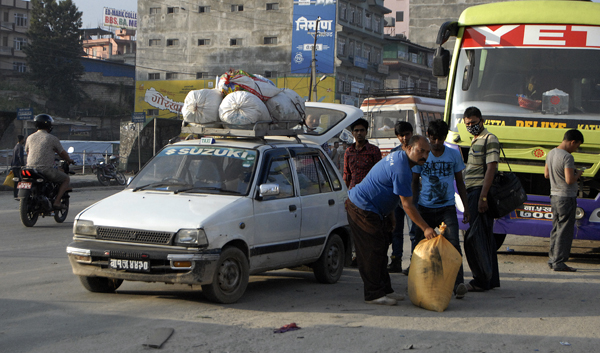Is govt overlooking syndicate in cab services?
Kathmandu, April 23
At the time when the government is acting harsh against the syndicate system prevalent in the public transportation sector, it seems to have overlooked similar practice rampant in cab services of the country.
Similar to public transportation sector, cab entrepreneurs have a monopoly in taxi services in Nepal, which has also prevented competitive growth in the sector. However, the government itself has been preserving the syndicate system in cab services by barring registration of new taxis since many years.
Thus, if the government really wants to make transportation industry free from syndicate system, this is the right time to end this anti-competitive practice simultaneously in both public transportation and cab services, according to consumer rights activists.
“On one hand, the government declares it is adopting ‘zero tolerance' approach towards syndicate system in the public transportation industry, while it has been implementing self-preserving laws to promote such practices in cab services. This reflects ambiguity in government's approach towards syndicate system in the transportation sector,” said Madhav Timalsina, president of Consumers' Right Investigation Forum (CRIF).
Besides issuing new 1,850 taxi permits in August 2015 and 1,500 permits to quake-affected people in June last year, the government has not accepted registration of new cabs in the country since 2000. As a result, existing taxi operators have been maintaining monopoly in their services and overcharging commuters rampantly.
Moreover, issuing taxi permits sporadically on quota basis is also regarded as an act that promotes syndicate.
Once existing taxis become old or cross 20 years of age, the government has been allowing existing cab operators to register new taxis with the same number plate.
Thus, anyone who wants to start cab service in the country for livelihood are compelled to purchase the ownership of cab from existing taxi operators at a high cost though they could easily enter into business if the government had opened registration of taxis.
Moreover, it is also said that taxi operators in Nepal prefer not to run on ‘meter' that displays scientific travel fare as they have high investment while entering the cab service, including cost of cabs and ownership transfer..
If the government opens up registration of new taxis and issues taxi permits in different routes scientifically, Timalsina said that it will not only increase competition in the taxi services but will also bring down taxi fares and standardise the cab service in Nepal.
As per statistics of the government, almost 16,000 taxis have been registered in Nepal, of which almost 9,000 taxis are registered in Bagmati Zone alone.
Meanwhile, officials of Department of Transport Management (DoTM) also believe that registration of new taxis should be opened up and new taxi routes should be explored to end syndicate in transportation industry completely.
“Discussions are under way to revisit the taxi registration system and taxi routes. We will soon come up with a decision,” said Rupnarayan Bhattarai, director general at DoTM, adding that syndicate system will be erased from the transportation industry gradually and completely.
Meanwhile, taxi operators have denied that there is any syndicate system in cab services in Nepal. “However, the government should first conduct a need assessment of cabs in Nepal before allowing new taxi permits,” said Rohan Shrestha, secretary of Nepal Meter Taxi Association (NMTA).
As per Shrestha, number of cabs is already high in the country and the government should instead prioritise promoting cab services. “Regarding quality service, the government should first assure good roads, proper parking space and revisit taxi fare at the earliest.”






